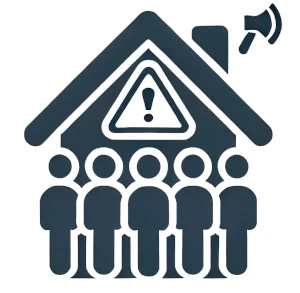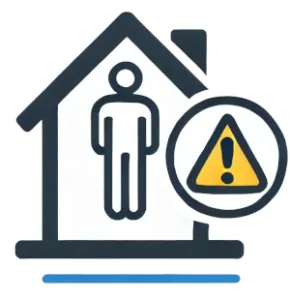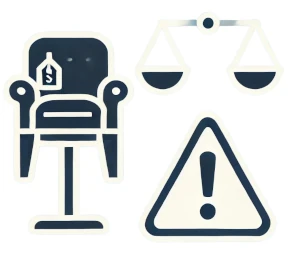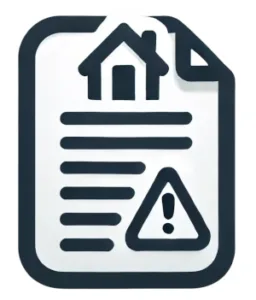The Biggest Pitfalls of Buying Property in Spain

Author: Eve Keerus-Jusupov, CEO of Merlis Homes SL.
Helping you navigate Costa del Sol property with confidence and peace of mind.
Have a question? Contact me via WhatsApp

Imagine a Nightmare:
You’ve just purchased your dream home on the Costa del Sol. Instead of enjoying your first sunny morning, you find yourself grappling with penalty claims because the property lacks an occupancy license.
You can’t set up electricity or water contracts, and your neighbor informs you that the parking space you thought was yours actually belongs to them. You’ve fallen into a property trap where mistakes, dangers, and risks seem to follow you at every step.
Even worse, after the purchase, you discover that part of the building was constructed without the necessary permits, and the local council demands its demolition.
Meanwhile, you learn that the homeowners’ association has debts running into tens of thousands of euros, part of which now falls on you. What was meant to be a step toward fulfilling your dreams has turned into financial and emotional chaos.
This is the harsh reality many buyers face when they overlook the biggest pitfalls of buying property in Spain. What should have been a joyful milestone becomes a costly, stressful ordeal.
But it doesn’t have to be this way. In this article, I’ll highlight the most costly and dangerous pitfalls that property buyers face on the Costa del Sol—and, more importantly, how you can avoid them wisely.
Read on and learn how to protect yourself from the issues that have shattered the dreams of so many buyers. Better safe than sorry—or worse, facing significant financial loss!
Table of Contents
- Pitfall 1 – Not Verifying the True Size and Condition of the Property
- Pitfall 2 – Risks of Applying for a Bank Loan Without Preparation
- Pitfall 3 – Buying Without a Tourist License or Ignoring Rental Restrictions
- Pitfall 4 – Buying a Property Without an Occupancy License (Licencia de Primera Ocupación)
- Pitfall 5 – Unclear or Disputed Ownership Status
- Pitfall 6 – Parking Spaces and Storage Rooms Not Properly Included in the Contract
- Pitfall 7 – Buying a Property Still Occupied by a Tenant or Resident
- Pitfall 8 – Believing a Buyer’s Agent Costs Extra
- Pitfall 9 – Overpaying for Furniture in a Property Deal
- Pitfall 10 – Currency Fluctuations When Paying in Foreign Exchange
- Pitfall 11 – Seller or Seller’s Agent Attempts to Unilaterally Reduce the Buyer’s Agent Commission After Signing the Reservation Agreement
- Pitfall 12 – Misjudging the Neighborhood or Urbanization
- Pitfall 13 – Underestimating Renovation Costs
- Pitfall 14 – Underestimating Post-Purchase Taxes and Maintenance Costs
- Pitfall 15 – Agreeing to an Unfair Price
- Pitfall 16 – Missing the Certificado de No Infracción Urbanística (CNUI)
- Pitfall 17 – Being Tempted by a Suspiciously Low Price
- Pitfall 18 – Rushing to Sign a Reservation Agreement
- Pitfall 19 – Overlooking the Nota Simple
- Pitfall 20 – Missing the Land Registry (Cadastral) Certificate
- Pitfall 21 – Debts of Urbanizations and Homeowners’ Associations (Including Hidden Ones)
- Pitfall 22 – Seller Raising the Price After the Reservation Agreement
- Pitfall 23 – Risks of Buying Off-Plan
- Pitfall 24 – Purchasing Illegally Built Property
- Pitfall 25 – Buying Property with Unpermitted Modifications
- Pitfall 26 – Skipping a Real Estate Specialist Lawyer
Pitfall 1 – Not Verifying the True Size and Condition of the Property
The Problem
The size and condition of the property as stated in the documents or advertisements may differ from reality, leading to unexpected costs and usability issues.
Example
A buyer purchases a house listed as 150 m² in the documents, but later measurements reveal that the actual living area is only 120 m².
The Solution
If in doubt, commission an independent technical inspection to confirm the property’s actual size and condition. Cross-check the property details with the land registry and sales agreement to ensure accuracy.
For properties with land, measure the land area and boundaries to verify they match the documents. Discrepancies in land size or ownership could result in disputes with neighbors or local authorities.
Pitfall 1 – Not Verifying the True Size and Condition of the Property

The Problem
The size and condition of the property as stated in the documents or advertisements may differ from reality, leading to unexpected costs and usability issues.
Example
A buyer purchases a house listed as 150 m² in the documents, but later measurements reveal that the actual living area is only 120 m².
The Solution
If in doubt, commission an independent technical inspection to confirm the property’s actual size and condition. Cross-check the property details with the land registry and sales agreement to ensure accuracy.
For properties with land, measure the land area and boundaries to verify they match the documents. Discrepancies in land size or ownership could result in disputes with neighbors or local authorities.
Pitfall 2 – Risks of Applying for a Bank Loan Without Preparation
The Problem
Incomplete understanding of loan terms and processes can lead to financial difficulties, including higher interest rates, additional fees, or even failure to secure a loan for the intended property.
Example
A buyer signs a reservation agreement and pays a deposit, but the bank later refuses the loan, for example, due to the buyer’s insufficient creditworthiness.
The Solution
Consult with the bank before signing a purchase agreement to obtain pre-approval for your borrowing capacity and the property’s eligibility. Consider seeking advice from an independent financial advisor to compare loan terms and understand all associated costs, including notary fees, appraisal costs, and loan insurance premiums.
A reliable real estate agent will protect your interests and ensure the reservation agreement includes a clause allowing you to recover your deposit if the loan is not approved.
This step alone can save you from one of the most common buying property in Spain pitfalls.
Pitfall 3 – Buying Without a Tourist License or Ignoring Rental Restrictions
The Problem
Without a tourist license, short-term rentals are not legal, and rental bans imposed by certain areas or homeowners’ associations can make your investment unprofitable.
Example
A buyer plans to rent out the property on Airbnb, but after the purchase discovers that the local government no longer issues tourist licenses or imposes significant restrictions in that area, or that the homeowners’ association prohibits short-term rentals.
The Solution
Before signing a reservation agreement, verify whether the property meets the conditions for obtaining a tourist license, and review the rules set by the homeowners’ association and local government. A local real estate agent should be able to provide you with this information. Additionally, consult with a lawyer to ensure there are no rental restrictions or bans associated with the property.
This due diligence will protect you from one of the most common pitfalls of buying property in Spain—assuming rental income that later proves impossible.
Pitfall 3 – Buying Without a Tourist License or Ignoring Rental Restrictions

The Problem
Without a tourist license, short-term rentals are not legal, and rental bans imposed by certain areas or homeowners’ associations can make your investment unprofitable.
Example
A buyer plans to rent out the property on Airbnb, but after the purchase discovers that the local government no longer issues tourist licenses or imposes significant restrictions in that area, or that the homeowners’ association prohibits short-term rentals.
The Solution
Before signing a reservation agreement, verify whether the property meets the conditions for obtaining a tourist license, and review the rules set by the homeowners’ association and local government. A local real estate agent should be able to provide you with this information. Additionally, consult with a lawyer to ensure there are no rental restrictions or bans associated with the property.
This due diligence will protect you from one of the most common pitfalls of buying property in Spain—assuming rental income that later proves impossible.
Pitfall 4 – Buying a Property Without an Occupancy License (Licencia de Primera Ocupación)
The Problem
One of the most overlooked pitfalls of buying property in Spain is failing to check for an occupancy license. Without an occupancy license or an equivalent document, the legal use and resale of the property become challenging.
Example
A buyer discovers after the purchase that the building was constructed without the necessary permits, and a pending fine from the local authority must be paid by the new owner.
The Solution
Before proceeding with the purchase, request an official copy of the occupancy license (or have your lawyer do so) and verify its validity with the local authorities.
Pitfall 5 – Unclear or Disputed Ownership Status
The Problem
If the ownership status of a property is unclear or it has multiple owners, it can lead to legal disputes and hinder the buyer’s right to use or sell the property. Inherited properties are a particular concern—inheritance processes may be delayed if documentation is incomplete, there are multiple heirs, or the heir is a minor, among other issues.
Example
A buyer purchases a property, only to later discover that the seller was a co-owner and the other co-owners opposed the sale, rendering the transaction invalid.
The Solution
Verify the ownership status of the property through a Nota Simple and ensure the seller has full legal authority to sell. Engage a lawyer to confirm the validity of the ownership and resolve any potential co-ownership issues before the purchase.
This extra step helps you avoid one of the most damaging pitfalls of buying property in Spain: investing in a home that you cannot legally claim as yours.
Pitfall 5 – Unclear or Disputed Ownership Status

The Problem
If the ownership status of a property is unclear or it has multiple owners, it can lead to legal disputes and hinder the buyer’s right to use or sell the property. Inherited properties are a particular concern—inheritance processes may be delayed if documentation is incomplete, there are multiple heirs, or the heir is a minor, among other issues.
Example
A buyer purchases a property, only to later discover that the seller was a co-owner and the other co-owners opposed the sale, rendering the transaction invalid.
The Solution
Verify the ownership status of the property through a Nota Simple and ensure the seller has full legal authority to sell. Engage a lawyer to confirm the validity of the ownership and resolve any potential co-ownership issues before the purchase.
This extra step helps you avoid one of the most damaging pitfalls of buying property in Spain: investing in a home that you cannot legally claim as yours.
Pitfall 6 – Parking Spaces and Storage Rooms Not Properly Included in the Contract
The Problem
If the parking space and storage room are not explicitly mentioned in the reservation agreement or their ownership is not verified, the buyer may later discover that these are not part of the property or are registered under a different owner.
Example
A buyer assumes they are purchasing an apartment with a parking space and storage room, but after the transaction, it turns out these are separately registered properties, and the seller is not their owner. As a result, the buyer cannot use the parking space or storage room.
The Solution
Before signing the reservation agreement, your lawyer or real estate agent should verify through the land registry whether the parking space and storage room are integral parts of the property or separately registered. The reservation agreement must clearly specify the details of the parking space and storage room. The lawyer should also confirm their ownership status and ensure they are transferred together with the property.
Note: Always review the contract text and ensure all details are accurate to avoid disputes and additional costs.
Pitfall 7 – Buying a Property Still Occupied by a Tenant or Resident
The Problem
One of the hidden pitfalls of buying property in Spain is overlooking whether the home is legally occupied. A tenant or even the seller themselves may still have rights of use. In such cases, removing them can be legally complex, costly, and sometimes impossible until contracts expire.
Example
A buyer purchases a property only to later discover that the resident tenant has legal rights under a long-term lease that cannot be terminated before the contract expires.
The Solution
Before purchasing, verify whether the property is subject to any contractual or legal occupancy rights. Have your lawyer review any encumbrances on the property and ensure the sales agreement includes a clause confirming the property will be delivered free of third-party rights. Additionally, personally confirm that the property is vacant before completing the transaction.
Pitfall 7 – Buying a Property Still Occupied by a Tenant or Resident

The Problem
One of the hidden pitfalls of buying property in Spain is overlooking whether the home is legally occupied. A tenant or even the seller themselves may still have rights of use. In such cases, removing them can be legally complex, costly, and sometimes impossible until contracts expire.
Example
A buyer purchases a property only to later discover that the resident tenant has legal rights under a long-term lease that cannot be terminated before the contract expires.
The Solution
Before purchasing, verify whether the property is subject to any contractual or legal occupancy rights. Have your lawyer review any encumbrances on the property and ensure the sales agreement includes a clause confirming the property will be delivered free of third-party rights. Additionally, personally confirm that the property is vacant before completing the transaction.
Pitfall 8 – Believing a Buyer’s Agent Costs Extra
The Problem
Many buyers mistakenly believe that hiring a buyer’s agent incurs extra costs, leading them to forego professional representation. This can result in costly mistakes during the purchase process.
Example
A buyer decides to proceed without a buyer’s agent, assuming it will save money. Later, they discover they paid 10% above market value for the property due to a lack of professional advice and market analysis.
The Solution
On the Costa del Sol, agent fees are typically paid by the seller or the seller’s agent, meaning a buyer’s agent’s services are usually free for the buyer. Before starting the purchase process, clarify with your agent what fees apply, and take advantage of their expertise to avoid overpaying or encountering legal issues.
Pitfall 9 – Overpaying for Furniture in a Property Deal
The Problem
A subtle but costly pitfall of buying property in Spain is agreeing to pay an inflated price for furniture. Some sellers reduce the declared property value and inflate the furniture price, which may seem like a tax-saving strategy at first. In reality, it can backfire by increasing your capital gains tax when you resell the property.
Example
A buyer pays €50,000 for furniture worth only €10,000 to reduce the declared property price. Later, when selling the property, they face higher capital gains tax due to the larger increase in the declared property value.
The Solution
Verify the market value of the furniture and insist on a fair price from the seller. Engage a lawyer and a buyer’s agent to ensure that the property and furniture prices are correctly allocated based on their actual value and that no tax obligations are improperly adjusted.
Pitfall 9 – Overpaying for Furniture in a Property Deal

The Problem
A subtle but costly pitfall of buying property in Spain is agreeing to pay an inflated price for furniture. Some sellers reduce the declared property value and inflate the furniture price, which may seem like a tax-saving strategy at first. In reality, it can backfire by increasing your capital gains tax when you resell the property.
Example
A buyer pays €50,000 for furniture worth only €10,000 to reduce the declared property price. Later, when selling the property, they face higher capital gains tax due to the larger increase in the declared property value.
The Solution
Verify the market value of the furniture and insist on a fair price from the seller. Engage a lawyer and a buyer’s agent to ensure that the property and furniture prices are correctly allocated based on their actual value and that no tax obligations are improperly adjusted.
Pitfall 10 – Currency Fluctuations When Paying in Foreign Exchange
The Problem
Exchange rate fluctuations can significantly increase the final cost of the property, resulting in unexpected additional expenses for the buyer.
Example
A buyer calculates the property cost based on an exchange rate of €1 = £0.83, but by the time the transaction occurs, the rate has risen to €1 = £0.87, increasing the purchase cost by thousands of pounds beyond the buyer’s budget.
The Solution
Use a currency exchange service that offers a fixed exchange rate option to shield yourself from fluctuations. Plan transactions carefully and consult with a financial expert to choose the best timing for payments and mitigate currency risks.
Pitfall 11 – Seller or Seller’s Agent Attempts to Unilaterally Reduce the Buyer’s Agent Commission After Signing the Reservation Agreement
The Problem
Another overlooked pitfall of buying property in Spain is failing to check how commissions are defined in the reservation agreement. If the reservation agreement does not clearly stipulate all parties’ commission fees and prohibit unilateral changes, the seller or the seller’s agent may later reduce the commission, causing financial loss to the buyer’s agent. This may result in the buyer’s agent seeking compensation directly from the buyer.
Example
The reservation agreement does not specify that the agreed commission cannot be altered. After the agreement is signed, the seller or seller’s agent reduces the commission, leading the buyer’s agent to request additional fees from the buyer.
The Solution
Ensure the reservation agreement includes a clause confirming the agreed commission distribution and prohibiting unilateral changes without written consent from all parties. This protects all parties, including the buyer and agents, from unexpected changes. Use the assistance of a lawyer or an experienced buyer’s agent to draft the agreement and avoid disputes or additional costs.
Pitfall 11 – Seller or Seller’s Agent Attempts to Unilaterally Reduce the Buyer’s Agent Commission After Signing the Reservation Agreement

The Problem
Another overlooked pitfall of buying property in Spain is failing to check how commissions are defined in the reservation agreement. If the reservation agreement does not clearly stipulate all parties’ commission fees and prohibit unilateral changes, the seller or the seller’s agent may later reduce the commission, causing financial loss to the buyer’s agent. This may result in the buyer’s agent seeking compensation directly from the buyer.
Example
The reservation agreement does not specify that the agreed commission cannot be altered. After the agreement is signed, the seller or seller’s agent reduces the commission, leading the buyer’s agent to request additional fees from the buyer.
The Solution
Ensure the reservation agreement includes a clause confirming the agreed commission distribution and prohibiting unilateral changes without written consent from all parties. This protects all parties, including the buyer and agents, from unexpected changes. Use the assistance of a lawyer or an experienced buyer’s agent to draft the agreement and avoid disputes or additional costs.
Pitfall 12 – Misjudging the Neighborhood or Urbanization
The Problem
Poor infrastructure, lack of services, or a bad reputation in a neighborhood or urbanization can negatively impact property value and quality of life.
Example
A buyer opts for a cheap apartment in an urbanization but later discovers frequent utility disruptions, high maintenance fees, low security, or that the area has a high crime rate.
The Solution
Research the reputation and infrastructure of the area, inquire about local services (transport, shops, healthcare), and analyze utility and maintenance costs. Visit the property at different times of the day and speak with neighbors or local residents to gain a clearer understanding of the living environment.
Pitfall 13 – Underestimating Renovation Costs
The Problem
The actual costs of renovating a property may be significantly higher than expected, leading to budget overruns and financial strain.
Example
A buyer purchases an older house, assuming minor repairs will suffice, only to later discover serious foundation issues requiring repairs costing over €50,000.
The Solution
Before agreeing on the price, commission a professional property inspection (costing up to approximately €1,000) to assess the property’s true condition and potential renovation costs. This official report not only helps in negotiations but also protects you from one of the most expensive pitfalls of buying property in Spain.
Pitfall 13 – Underestimating Renovation Costs

The Problem
The actual costs of renovating a property may be significantly higher than expected, leading to budget overruns and financial strain.
Example
A buyer purchases an older house, assuming minor repairs will suffice, only to later discover serious foundation issues requiring repairs costing over €50,000.
The Solution
Before agreeing on the price, commission a professional property inspection (costing up to approximately €1,000) to assess the property’s true condition and potential renovation costs. This official report not only helps in negotiations but also protects you from one of the most expensive pitfalls of buying property in Spain.
Pitfall 14 – Underestimating Post-Purchase Taxes and Maintenance Costs
The Problem
Buyers may overlook monthly maintenance costs and property taxes, exceeding their budget and making property ownership more expensive than planned.
Example
After the purchase, a buyer discovers that the annual IBI tax (property tax), non-resident income tax, and urbanization maintenance fees total €15,000 per year—an expense they had not accounted for when making the decision.
The Solution
Research the exact costs of regular maintenance, insurance, and property taxes. Engage a lawyer or real estate agent to analyze these expenses and incorporate them into your budget.
Pitfall 15 – Agreeing to an Unfair Price
The Problem
Foreign buyers often overpay for properties due to a lack of detailed knowledge about the local market or insufficient negotiation skills.
Example
A buyer purchases an apartment for €350,000, while similar properties in the area have sold for €300,000, influenced by the selling agent emphasizing the property’s “uniqueness.”
The Solution
Conduct thorough market research and compare prices of similar properties in the area. Engage a buyer’s agent who knows the market, has access to local property databases, and can negotiate a fair price on your behalf.
Pitfall 15 – Agreeing to an Unfair Price

The Problem
Foreign buyers often overpay for properties due to a lack of detailed knowledge about the local market or insufficient negotiation skills.
Example
A buyer purchases an apartment for €350,000, while similar properties in the area have sold for €300,000, influenced by the selling agent emphasizing the property’s “uniqueness.”
The Solution
Conduct thorough market research and compare prices of similar properties in the area. Engage a buyer’s agent who knows the market, has access to local property databases, and can negotiate a fair price on your behalf.
Pitfall 16 – Missing the Certificado de No Infracción Urbanística (CNUI)
The Problem
The CNUI certifies that a property is not involved in illegal construction work or urban planning violations. Its absence may indicate that the property is subject to fines, demolition orders, or restrictions on legalizing existing structures.
Example
After the transaction, a buyer discovers that the property includes illegal construction work that does not comply with local urban planning regulations, and the local council demands legalization or demolition.
The Solution
Before purchasing, request the CNUI from the local council or have your lawyer obtain it. This document confirms that the property has no urban planning violations or construction-related issues. Having the CNUI provides assurance that the property complies with current regulations and avoids unforeseen legal or financial obligations.
Pitfall 17 – Being Tempted by a Suspiciously Low Price
The Problem
Properties that seem unusually cheap may hide legal, technical, or regulatory issues that could become costly for the buyer later on.
Example
A buyer finds a house significantly below the average market price in the area but later discovers it lacks essential building permits, an occupancy license, or is in poor technical condition.
The Solution
Investigate thoroughly why the property is priced below market value. Review all documentation, and involve a lawyer and a technical inspector to ensure the low price does not stem from significant hidden defects or legal risks.
Pitfall 17 – Being Tempted by a Suspiciously Low Price

The Problem
Properties that seem unusually cheap may hide legal, technical, or regulatory issues that could become costly for the buyer later on.
Example
A buyer finds a house significantly below the average market price in the area but later discovers it lacks essential building permits, an occupancy license, or is in poor technical condition.
The Solution
Investigate thoroughly why the property is priced below market value. Review all documentation, and involve a lawyer and a technical inspector to ensure the low price does not stem from significant hidden defects or legal risks.
Pitfall 18 – Rushing to Sign a Reservation Agreement
The Problem
Signing a reservation agreement and paying a deposit before thoroughly inspecting the property can lead to financial loss or binding the buyer to unfavorable terms.
Example
A buyer pays a €6,000 reservation fee but later discovers that the property lacks an occupancy license. The deposit is not refunded.
The Solution
Carefully review the terms of the reservation agreement and involve a lawyer to ensure the agreement includes clauses guaranteeing the refund of the deposit if significant issues with the property are uncovered. Merlis Homes agents include approximately 10 conditions in their clients’ reservation agreements, obligating the seller to return the deposit under specific circumstances.
Pitfall 19 – Overlooking the Nota Simple
The Problem
The Nota Simple is a crucial document that details property ownership, encumbrances, and any potential legal restrictions. Its absence may indicate that the property is not registered in the Land Registry. This can occur with very old properties, legally unregistered properties, or plots of land without building permits.
Example
A buyer signs a purchase agreement and later discovers that the property is subject to an undisclosed mortgage, leaving the buyer responsible for the debt.
The Solution
Always obtain an up-to-date Nota Simple from the local Land Registry (Registro de la Propiedad) before purchasing a property to verify ownership, mortgages, and other encumbrances. This can be done by a lawyer or a real estate agent on behalf of the buyer.
Clarification
The Nota Simple is an informative document and does not replace an official land registry extract, but it is a quick and practical way to assess the legal status of a property.
Pitfall 19 – Overlooking the Nota Simple

The Problem
The Nota Simple is a crucial document that details property ownership, encumbrances, and any potential legal restrictions. Its absence may indicate that the property is not registered in the Land Registry. This can occur with very old properties, legally unregistered properties, or plots of land without building permits.
Example
A buyer signs a purchase agreement and later discovers that the property is subject to an undisclosed mortgage, leaving the buyer responsible for the debt.
The Solution
Always obtain an up-to-date Nota Simple from the local Land Registry (Registro de la Propiedad) before purchasing a property to verify ownership, mortgages, and other encumbrances. This can be done by a lawyer or a real estate agent on behalf of the buyer.
Clarification
The Nota Simple is an informative document and does not replace an official land registry extract, but it is a quick and practical way to assess the legal status of a property.
Pitfall 20 – Missing the Land Registry (Cadastral) Certificate
The Problem
The absence of a cadastral certificate may indicate that the property is not properly registered, or that its boundaries and size do not match reality, leading to legal and tax complications.
Example
After the purchase, the buyer discovers that the cadastral boundaries of the property overlap with a neighbor’s land, resulting in a dispute and additional expenses to resolve the issue.
The Solution
Before purchasing, ensure that the property is correctly registered in the cadastral system and that its details (size, boundaries, purpose) match the actual situation. Have a lawyer review the cadastral certificate and municipal records to identify and resolve any potential discrepancies.
Pitfall 21 – Debts of Urbanizations and Homeowners’ Associations (Including Hidden Ones)
The Problem
Under Spanish law, unpaid debts owed to a homeowners’ association or urbanization can partially transfer to the new owner, leading to unexpected additional expenses.
Example
After purchasing the property, the buyer discovers that the urbanization has a €20,000 debt for pool renovations, with the costs divided among all property owners.
The Solution
Before buying, review the financial status of the homeowners’ association or urbanization and request written confirmation that the property has no outstanding debts. Ensure the seller has settled all obligations with the association, and have a lawyer include a clause in the notarial deed confirming that the property is sold free of hidden debts.
Overlooking this due diligence is one of the easiest buying property in Spain pitfalls to avoid—yet it continues to trap many unsuspecting buyers.
Pitfall 21 – Debts of Urbanizations and Homeowners’ Associations (Including Hidden Ones)

The Problem
Under Spanish law, unpaid debts owed to a homeowners’ association or urbanization can partially transfer to the new owner, leading to unexpected additional expenses.
Example
After purchasing the property, the buyer discovers that the urbanization has a €20,000 debt for pool renovations, with the costs divided among all property owners.
The Solution
Before buying, review the financial status of the homeowners’ association or urbanization and request written confirmation that the property has no outstanding debts. Ensure the seller has settled all obligations with the association, and have a lawyer include a clause in the notarial deed confirming that the property is sold free of hidden debts.
Overlooking this due diligence is one of the easiest buying property in Spain pitfalls to avoid—yet it continues to trap many unsuspecting buyers.
Pitfall 22 – Seller Raising the Price After the Reservation Agreement
The Problem
If the reservation agreement does not include a clause prohibiting price changes, the seller may attempt to demand a higher price after the agreement is signed.
Example
A buyer signs a reservation agreement and pays the deposit, but the seller later informs them, before the preliminary or final sale agreement, that the price has increased by €20,000, threatening to cancel the deal otherwise.
The Solution
Ensure that the reservation agreement explicitly states the final price and includes terms prohibiting the seller from raising it. Engage a lawyer or a local buyer’s agent to ensure the agreement protects the buyer and includes penalties for the seller in case of breach.
Pitfall 23 – Risks of Buying Off-Plan
The Problem
Purchasing an off-plan property can involve delays, developer bankruptcy, or project changes that jeopardize your investment and intended use.
Example
A buyer pays a deposit for an under-construction apartment, but the developer goes bankrupt before completing the project, leaving the buyer without the property or their money.
The Solution
Research the developer’s background and financial stability, and ensure that deposits are secured with a bank guarantee (Aval Bancario) or insurance from a reputable agency. Have a lawyer review the purchase contract to include clear terms for delays or project changes and guarantee the return of deposits if the project is not completed.
Pitfall 23 – Risks of Buying Off-Plan

The Problem
Purchasing an off-plan property can involve delays, developer bankruptcy, or project changes that jeopardize your investment and intended use.
Example
A buyer pays a deposit for an under-construction apartment, but the developer goes bankrupt before completing the project, leaving the buyer without the property or their money.
The Solution
Research the developer’s background and financial stability, and ensure that deposits are secured with a bank guarantee (Aval Bancario) or insurance from a reputable agency. Have a lawyer review the purchase contract to include clear terms for delays or project changes and guarantee the return of deposits if the project is not completed.
Pitfall 24 – Purchasing Illegally Built Property
The Problem
Properties without proper building permits may be prohibited from use, subject to demolition orders, or remain legally unregistered. This issue is particularly common in rural areas.
Example
A buyer purchases a house, only to later discover that the terrace and pool were built without permits, and the local council demands their removal.
The Solution
Verify the property’s building permits and ensure compliance with local municipal records. Engage a lawyer to thoroughly investigate the legal status of the property before purchase.
If the seller mentions the following terms, you should be aware of their meaning:
- AFO (Asimilado Fuera de Ordenación): A status granted to illegally built properties that are deemed usable under certain conditions. While not fully compliant with regulations, the property can be used without the risk of demolition.
- DAFO (Declaración Asimilado a Fuera de Ordenación): A process through which a property may acquire AFO status. The owner must provide evidence of the building’s habitability and safety.
- SAFO (Silencio Administrativo Fuera de Ordenación): A status that arises by default if authorities fail to make a decision on a DAFO application within a specified timeframe.
Pitfall 25 – Buying Property with Unpermitted Modifications
The Problem
Modifications such as additional rooms, terraces, or swimming pools made without permits may be illegal, leading to fines, demolition orders, or difficulties in selling or using the property.
Example
After the purchase, the buyer discovers that the swimming pool does not comply with local building regulations, and the local council demands its removal. Alternatively, a basement has been converted into a guest apartment without approval.
The Solution
Check with the land registry and the local council to confirm that all modifications are registered and comply with existing building permits. Engage a lawyer and a buyer’s agent to assess the property’s compliance with legal requirements and provide assurance that all changes are lawful.
Pitfall 25 – Buying Property with Unpermitted Modifications

The Problem
Modifications such as additional rooms, terraces, or swimming pools made without permits may be illegal, leading to fines, demolition orders, or difficulties in selling or using the property.
Example
After the purchase, the buyer discovers that the swimming pool does not comply with local building regulations, and the local council demands its removal. Alternatively, a basement has been converted into a guest apartment without approval.
The Solution
Check with the land registry and the local council to confirm that all modifications are registered and comply with existing building permits. Engage a lawyer and a buyer’s agent to assess the property’s compliance with legal requirements and provide assurance that all changes are lawful.
Pitfall 26 – Skipping a Real Estate Specialist Lawyer
The Problem
Without a lawyer specializing in real estate, buyers risk overlooking legal issues such as debts, incomplete documentation, or illegal constructions, potentially leading to significant financial losses.
Example
A buyer signs a purchase agreement without legal assistance, only to later discover that the property lacks an occupancy license, requiring thousands of euros and several months to legalize.
The Solution
Always hire a lawyer specializing in real estate to verify property ownership, encumbrances, and legality, as well as to draft or review all contracts. Ensure the lawyer has experience with Spanish property laws and operates independently of other parties, such as the seller or agent.
Watch Real Story from the Costa del Sol
Now that you’ve seen the real risks buyers face in Costa del Sol, make sure you download our Spanish Property Buying Guide. It gives you a clear, step-by-step roadmap so you can avoid these pitfalls and buy with confidence.
Looking for Help with Buying
Property on the Costa del Sol?

Eve Keerus-Jusupov
eve@merlishomes.com
I will respond to your inquiry within 24 hours.
tel (EST): +372 5661 6598
tel (ES): +34 644 810 107



